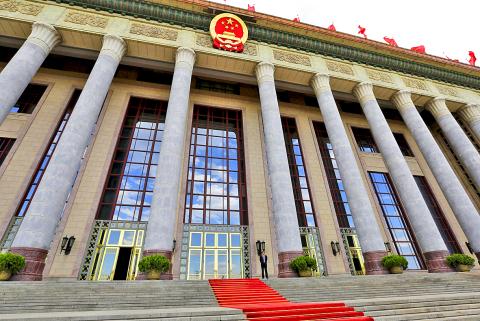China’s adoption yesterday of a new national security law that codified the inclusion of Taiwan was “very impolite behavior” toward Taiwan, Mainland Affairs Council Minister Andrew Hsia (夏立言) said, adding that the council would lodge a formal protest with Beijing.
The law adopted by the Standing Committee of the Chinese National People’s Congress (NPC) covers everything from territorial sovereignty and security of territorial seas and airspace to measures to tighten cybersecurity.
The Standing Committee passed the law by a vote of 154 to zero, with one abstention.

Photo: Reuters
It stipulates that: “Safeguarding China’s sovereignty and territorial integrity is the common obligation of all Chinese people, including people in Hong Kong, Macau and Taiwan.”
No unilateral action or lawmaking by the Chinese government could change the cross-strait reality, Hsia said, adding that the passage of the law was “very impolite behavior toward us.”
China should squarely face the fact that the two sides of the Taiwan Strait are governed by separate governments, he said.
Democratic Progressive Party spokesperson Cheng Yun-peng (鄭運鵬) criticized Beijing for disrespecting Taiwanese and called on the government to respond firmly to China’s move.
“The future of Taiwan should be decided by all 23 million people of Taiwan, and it is the mainstream opinion in Taiwan that we should insist on values of democracy and freedom, maintenance of the ‘status quo’ and constitutionalism — and these are not something that should be ripped off by the legislation of another country,” Cheng said. “What Beijing has done is disrespectful of Taiwanese, and it would not be acceptable in Taiwan.”
He urged the government to respond strongly to defend national interests and dignity.
Taiwan Solidarity Union Legislator Lai Cheng-chang (賴振昌) said that Beijing was “delusional and talking nonsense” by passing the law and called on President Ma Ying-jeou (馬英九) to halt all cross-strait exchanges immediately.
Another core component of the law is to make all key network infrastructure and information systems “secure and controllable.”
However, foreign business groups and diplomats have argued that the law is vague and fear it could require that technology firms make products in China or use source code released to inspectors, forcing them to expose intellectual property.
Zheng Shuna (鄭淑娜), vice chairwoman of the Legislative Affairs Commission of the NPC Standing Committee, downplayed those concerns, saying China welcomes “all countries’ businesses to operate in China and provide legitimate services according to law.”
“We will continue to follow the path of peaceful development, but we absolutely will not give up our legitimate rights and absolutely will not sacrifice the country’s core interests,” she said at a briefing in Beijing.
Critics have said that the extensive nature of the law, which covers everything from China’s deep sea and space assets to “harmful cultural influences,” constitutes national security overreach.
According to the law, which also covers crimes of subversion and inciting rebellion, Hong Kong and Macau must “fulfil responsibilities to safeguard national security.” That reference could spark more fears of Beijing encroaching on Hong Kong’s rule of law.
Additional reporting by Reuters and Chang Hsiao-ti

PREPAREDNESS: Given the difficulty of importing ammunition during wartime, the Ministry of National Defense said it would prioritize ‘coproduction’ partnerships A newly formed unit of the Marine Corps tasked with land-based security operations has recently replaced its aging, domestically produced rifles with more advanced, US-made M4A1 rifles, a source said yesterday. The unnamed source familiar with the matter said the First Security Battalion of the Marine Corps’ Air Defense and Base Guard Group has replaced its older T65K2 rifles, which have been in service since the late 1980s, with the newly received M4A1s. The source did not say exactly when the upgrade took place or how many M4A1s were issued to the battalion. The confirmation came after Chinese-language media reported

The Taiwanese passport ranked 33rd in a global listing of passports by convenience this month, rising three places from last month’s ranking, but matching its position in January last year. The Henley Passport Index, an international ranking of passports by the number of designations its holder can travel to without a visa, showed that the Taiwan passport enables holders to travel to 139 countries and territories without a visa. Singapore’s passport was ranked the most powerful with visa-free access to 192 destinations out of 227, according to the index published on Tuesday by UK-based migration investment consultancy firm Henley and Partners. Japan’s and

A Ministry of Foreign Affairs official yesterday said that a delegation that visited China for an APEC meeting did not receive any kind of treatment that downgraded Taiwan’s sovereignty. Department of International Organizations Director-General Jonathan Sun (孫儉元) said that he and a group of ministry officials visited Shenzhen, China, to attend the APEC Informal Senior Officials’ Meeting last month. The trip went “smoothly and safely” for all Taiwanese delegates, as the Chinese side arranged the trip in accordance with long-standing practices, Sun said at the ministry’s weekly briefing. The Taiwanese group did not encounter any political suppression, he said. Sun made the remarks when

BROAD AGREEMENT: The two are nearing a trade deal to reduce Taiwan’s tariff to 15% and a commitment for TSMC to build five more fabs, a ‘New York Times’ report said Taiwan and the US have reached a broad consensus on a trade deal, the Executive Yuan’s Office of Trade Negotiations said yesterday, after a report said that Washington is set to reduce Taiwan’s tariff rate to 15 percent. The New York Times on Monday reported that the two nations are nearing a trade deal to reduce Taiwan’s tariff rate to 15 percent and commit Taiwan Semiconductor Manufacturing Co (TSMC, 台積電) to building at least five more facilities in the US. “The agreement, which has been under negotiation for months, is being legally scrubbed and could be announced this month,” the paper said,